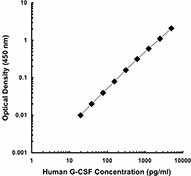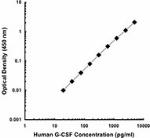- Clone
- BVD11-37G10 (See other available formats)
- Regulatory Status
- RUO
- Other Names
- Granulocyte-Colony Stimulating Factor, CSF-β, Pluripoietin, Granulocytic neutrophil colony stimulating activity (G-CSA), Macrophage-granulocyte inducer-2 (MGI-2)
- Isotype
- Rat IgG2a, κ
- Ave. Rating
- Submit a Review
- Product Citations
- publications

Granulocyte - colony stimulating factor (G-CSF) is a potent stimulator of bone marrow cells especially those of neutrophilic granulocyte lineage. In addition, G-CSF can enhance the survival and activate the immunological functions of mature neutrophils. G-CSF is produced primarily by monocytes and macrophages upon activation by endotoxin, TNF-alpha or IFN-gamma. The BVD11-37G10 antibody reacts with human granulocyte-colony stimulating factor (G-CSF).The BVD11-37G10 antibody can neutralize the bioactivity of natural or recombinant G-CSF.
Product DetailsProduct Details
- Verified Reactivity
- Human
- Antibody Type
- Monoclonal
- Host Species
- Rat
- Immunogen
- E. coli-expressed, recombinant human G-CSF
- Formulation
- Phosphate-buffered solution, pH 7.2, containing 0.09% sodium azide.
- Preparation
- The antibody was purified by affinity chromatography, and conjugated with biotin under optimal conditions.
- Concentration
- 0.5 mg/ml
- Storage & Handling
- The antibody solution should be stored undiluted between 2°C and 8°C. Do not freeze.
- Application
-
ELISA Detection, ELISPOT Detection
- Recommended Usage
-
Each lot of this antibody is quality control tested by ELISA assay. For use as an ELISA detection antibody, a concentration range of 1-4 µg/ml is recommended. It is recommended that the reagent be titrated for optimal performance for each application.
- Application Notes
-
ELISA or ELISPOT Detection1,2: The biotinylated BVD11-37G10 antibody is useful as a detection antibody for a sandwich ELISA or ELISPOT assay, when used in conjunction with purified BVD13-3A5 antibody (Cat. No. 502102/502104) as the capture antibody.
Additional reported applications (for the relevant formats) include: Western blotting, neutralization1,2, and immunohistochemistry3,4. -
Application References
(PubMed link indicates BioLegend citation) -
- Abrams J, et al. 1995. Curr. Prot. Immunol.. John Wiley and Sons New York. Unit 6.20
- Abrams J, et al. 1992. Immunol. Rev. 127:5.
- Andersson J, et al. 1994. Immunol. 83:16.
- Sander B, et al. 1991. Immunol. Rev. 119:65.
- RRID
-
AB_2083731 (BioLegend Cat. No. 506702)
Antigen Details
- Structure
- Cytokine; 21 kD (Mammalian)
- Bioactivity
- Growth/differentiation/activating factor for neutrophils; proliferation/migration endothelial cells cells; synergistic with IL-3 growth of hematopoietic progenitors
- Cell Sources
- Macrophages, monocytes, neutrophils, fibroblasts, endothelial cells, bone marrow stromal cells
- Cell Targets
- Hematopoietic progenitors of neutrophil/granulocyte lineage, endothelial cells
- Receptors
- CD114 (G-CSFR)
- Cell Type
- Neutrophils
- Biology Area
- Immunology
- Molecular Family
- Cytokines/Chemokines
- Antigen References
-
1. Fitzgerald K, et al. Eds. 2001. The Cytokine FactsBook. Academic Press San Diego.
2. Demetri G, et al. 1991. Blood 78:2791.
3. Moore M. 1991. Annu. Rev. Immunol. 9:159.
4. Negrin R, et al. 1992. Adv. Pharmacol. 23:263. - Regulation
- Upregulated by IL-1, IL-17, TNF-α, IFN-γ, GM-CSF; downregulated by prostaglandin E2
- Gene ID
- 1441 View all products for this Gene ID
- UniProt
- View information about G-CSF on UniProt.org
Related FAQs
- How many biotin molecules are per antibody structure?
- We don't routinely measure the number of biotins with our antibody products but the number of biotin molecules range from 3-6 molecules per antibody.
Other Formats
View All G-CSF Reagents Request Custom Conjugation| Description | Clone | Applications |
|---|---|---|
| Biotin anti-human G-CSF | BVD11-37G10 | ELISA Detection,ELISPOT Detection |
Compare Data Across All Formats
This data display is provided for general comparisons between formats.
Your actual data may vary due to variations in samples, target cells, instruments and their settings, staining conditions, and other factors.
If you need assistance with selecting the best format contact our expert technical support team.













Follow Us